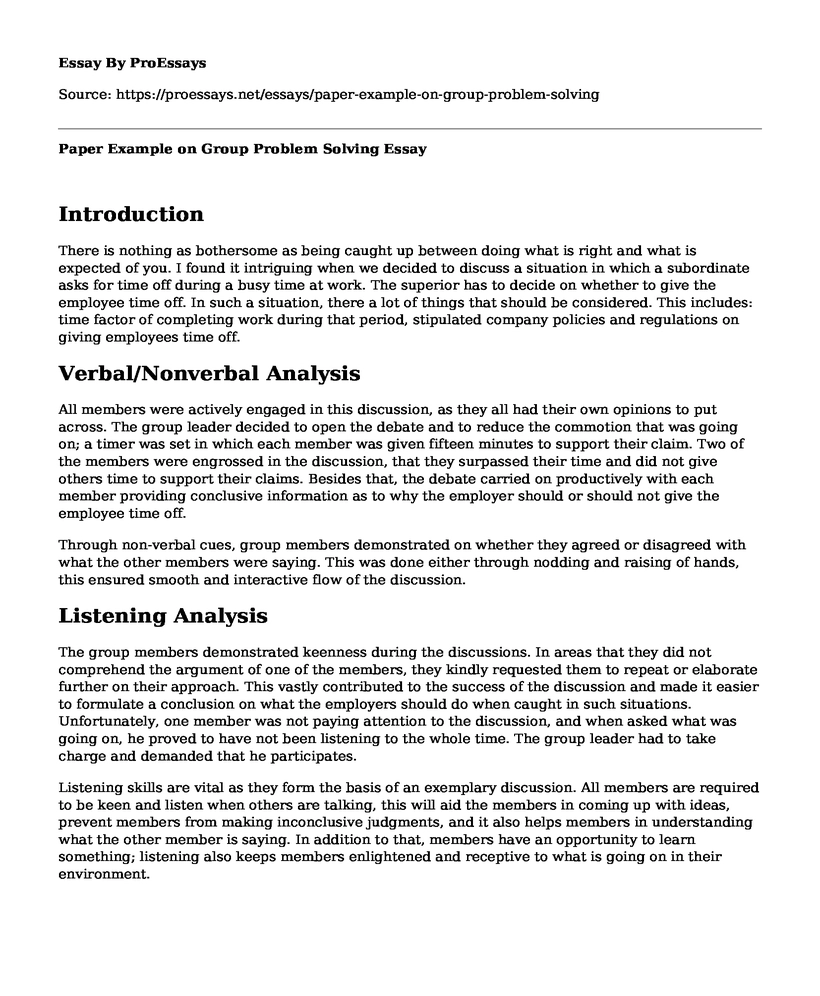Introduction
There is nothing as bothersome as being caught up between doing what is right and what is expected of you. I found it intriguing when we decided to discuss a situation in which a subordinate asks for time off during a busy time at work. The superior has to decide on whether to give the employee time off. In such a situation, there a lot of things that should be considered. This includes: time factor of completing work during that period, stipulated company policies and regulations on giving employees time off.
Verbal/Nonverbal Analysis
All members were actively engaged in this discussion, as they all had their own opinions to put across. The group leader decided to open the debate and to reduce the commotion that was going on; a timer was set in which each member was given fifteen minutes to support their claim. Two of the members were engrossed in the discussion, that they surpassed their time and did not give others time to support their claims. Besides that, the debate carried on productively with each member providing conclusive information as to why the employer should or should not give the employee time off.
Through non-verbal cues, group members demonstrated on whether they agreed or disagreed with what the other members were saying. This was done either through nodding and raising of hands, this ensured smooth and interactive flow of the discussion.
Listening Analysis
The group members demonstrated keenness during the discussions. In areas that they did not comprehend the argument of one of the members, they kindly requested them to repeat or elaborate further on their approach. This vastly contributed to the success of the discussion and made it easier to formulate a conclusion on what the employers should do when caught in such situations. Unfortunately, one member was not paying attention to the discussion, and when asked what was going on, he proved to have not been listening to the whole time. The group leader had to take charge and demanded that he participates.
Listening skills are vital as they form the basis of an exemplary discussion. All members are required to be keen and listen when others are talking, this will aid the members in coming up with ideas, prevent members from making inconclusive judgments, and it also helps members in understanding what the other member is saying. In addition to that, members have an opportunity to learn something; listening also keeps members enlightened and receptive to what is going on in their environment.
Conflict Analysis
The group members had varied opinions, some argued that it was the responsibility of the employers to give employees time off when they request for it no matter what the situation is in the workplace. Others claimed that employers shouldn't give time off since some employees tend to take advantage of the situation. Different members had their views on the subject matter. Hence the group gathered all this information and came up with conclusive solutions that would help employers facing such situations.
This discussion was not only beneficial for the group, but I also got a chance to learn new things and enhance my interpersonal communication skills. Some of the essential elements I gained was on how to positively influence the opinions of my members, how to effectively relate to circumstances affecting our society and also on how to handle conflicts that may arise during discussions.
Cite this page
Paper Example on Group Problem Solving. (2022, Apr 19). Retrieved from https://proessays.net/essays/paper-example-on-group-problem-solving
If you are the original author of this essay and no longer wish to have it published on the ProEssays website, please click below to request its removal:
- The Cultural and Social Transformation of Cardiff Paper Example
- Built Asset Management Paper Example
- Essay Sample on Human Resource Management: Incentive Compensation Strategy
- Business Model Design and Innovation Paper Example
- Essay on Career Guidance: Encouraging People to Rise Again & Make Favorable Decisions
- Essay Example on Breach Avoidance: It Can Be Done, It Must Be Done
- Paper Example on Data Protection: Privacy, Security & Trust Intertwined







